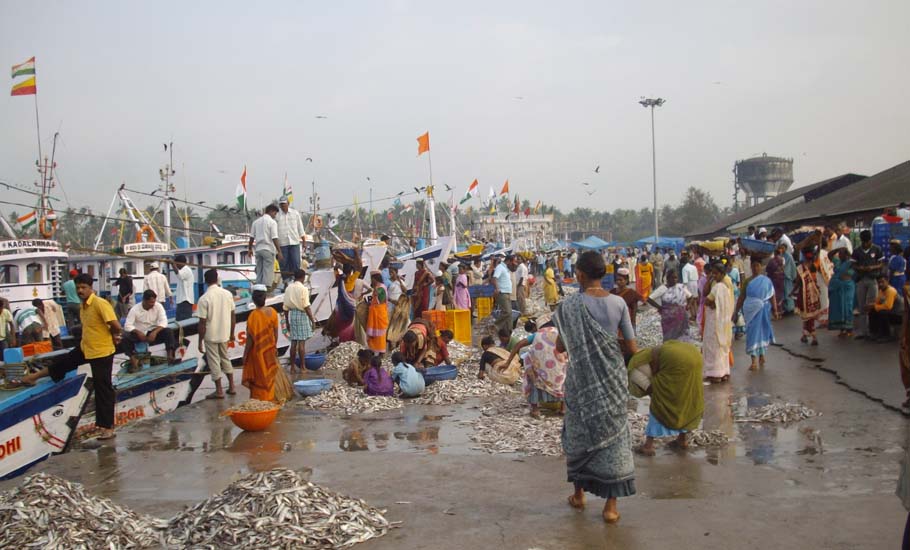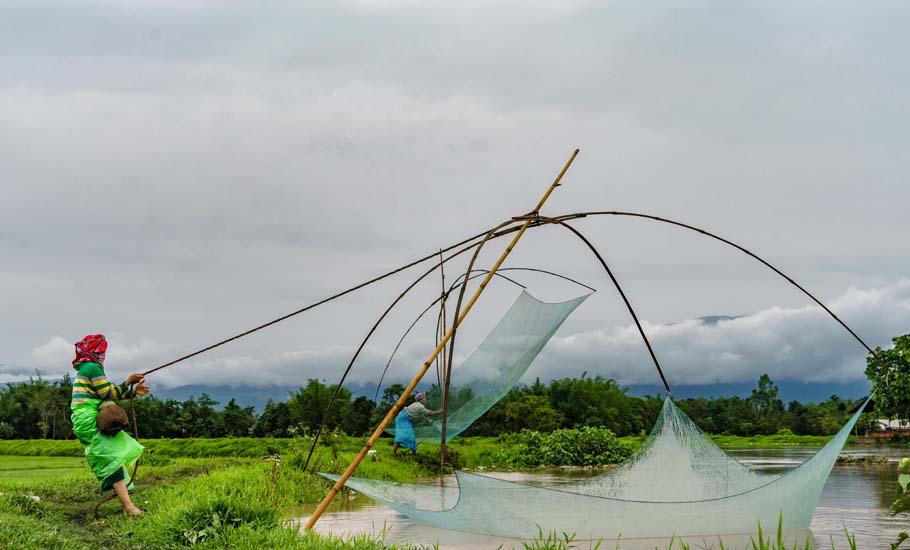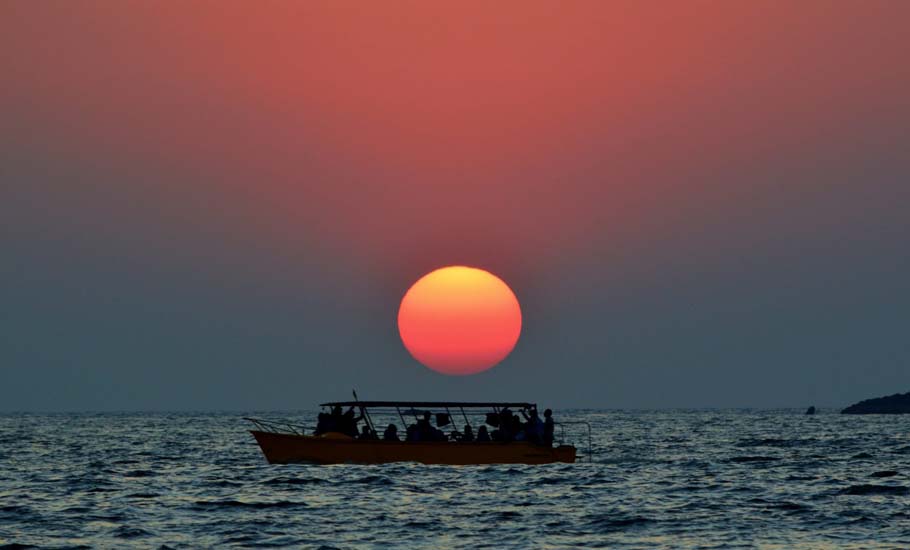
- Home
- News
- Analysis
- States
- Perspective
- Videos
- Education
- Entertainment
- Elections
- World Cup 2023
- Features
- Health
- Business
- Series
- Economy Series
- Earth Day
- Kashmir’s Frozen Turbulence
- India@75
- The legend of Ramjanmabhoomi
- Liberalisation@30
- How to tame a dragon
- Celebrating biodiversity
- Farm Matters
- 50 days of solitude
- Bringing Migrants Home
- Budget 2020
- Jharkhand Votes
- The Federal Investigates
- The Federal Impact
- Vanishing Sand
- Gandhi @ 150
- Andhra Today
- Field report
- Operation Gulmarg
- Pandemic @1 Mn in India
- The Federal Year-End
- The Zero Year
- Premium
- Science
- Brand studio
- Home
- NewsNews
- Analysis
- StatesStates
- PerspectivePerspective
- VideosVideos
- Entertainment
- ElectionsElections
- Sports
- Loading...
Sports - Features
- BusinessBusiness
- Premium
- Loading...
Premium

Hindu-Muslim rift leaves Gangolli’s air smelling fishy

Gangolli, a small village in the Udupi district, sees the Panchagangavalli River find its freedom by merging into the Arabian Sea. With the river flowing to its east and the Arabian Sea to its west, Gangolli, which is mentioned on the postal seal as Ganguli, offers the sight of a natural confluence. Its people, however, are falling apart mirroring a larger trend of communal differences...
Gangolli, a small village in the Udupi district, sees the Panchagangavalli River find its freedom by merging into the Arabian Sea. With the river flowing to its east and the Arabian Sea to its west, Gangolli, which is mentioned on the postal seal as Ganguli, offers the sight of a natural confluence. Its people, however, are falling apart mirroring a larger trend of communal differences and divisions in coastal Karnataka from Dakshina Kannada to Udupi.
In the latest such clash, Muslims of the region have decided to boycott fish sold by Hindus in the Gangolli market in the face of an alleged insult to Prophet Mohammad during a protest against cow slaughter.
On October 1, members of Hindu Jagarana Vedike, a right wing group associated with the Rashtriya Swayamsevak Sangh, took out a protest against illegal cow slaughter in Gangolli. The simmering tension came to a boil when some of the protesters reportedly started using insulting slogans against Prophet Mohammad. Among the thousands of the protesters were fisherwomen and fish vendors.
Beef versus fish
Incensed by this, members of the minority community called for a boycott of the fish being sold or traded by Hindus. Many of them say the boycott call is a response to the opposition to beef trade.
“We had no other option but to retaliate. Beef is something which gives inexpensive nutrition to many Muslims, but trust me, only 40 per cent of Muslims on the coast consume beef. Without the cooperation of our Hindu brothers we cannot get beef as the livestock trading is done by them,” said Mohammad Ishaq, who has been a beef trader for 30 years.
Abrar Ahmed, who runs a beef shop in Udupi’s Badriya, concurs. “I had been in this trade for the last 18 years and the business is not at all lucrative in terms of money. There is no exponential rise in beef eaters. Many of the traditional beef eaters have switched to fish, mutton, chicken and even vegetables, at least for a few days in a week. So sooner or later, the beef market will hit a slump,” fears Abrar Ahmed of Badriya beef stall in Mangaluru.
The anti-cattle slaughter law came into effect in Karnataka in February this year with then governor Vajubhai R Vala giving his assent to the bill. The bill makes it illegal to slaughter cattle other than buffaloes aged over 13 years.
According to the coastal beef trader’s association, the beef trade is to the tune of Rs 600 crore, which includes interstate figures, as the beef processed along Karnataka’s coast is also exported to Kerala, Goa and Maharashtra along with the hinterland of Karnataka.
The seeds of discord
What is happening in Gangolli is just a manifestation of growing communalism in Karnataka. For about four decades now, South Kanara, which covered the areas of the present-day Dakshina Kannada and Udupi districts of Karnataka, the Kasaragod District of Kerala, has gained the reputation of being the Sangh Parivar’s laboratory.
According to the official census 2011 and population data 2021 of Udupi district, 1,177,361 Hindus constitute 85.72 per cent of Udupi’s population, while the Muslim population stands at 8.22 per cent.

The Karnataka Land Reforms (Amendment) Act of 1974 transformed traditional landholding patterns leading to the rise of smaller landlords. While this brought in money for some many others began to migrate to Mumbai and the UAE.
The change created a vacuum in the region where people lacked a clear political direction. This period coincided with the Ram Mandir movement which took north India in its grip. While many south Indian states managed to dodge the impact, the Vishwa Hindu Parishad (VHP) managed to find its feet in Karnataka. The ground for VHP’s entry had, however, already been laid by Nagpur-headquartered Rashtriya Swayamsevak Sangh (RSS). Due to Nagpur’s geographical proximity to Karnataka, the RSS had been able to send its emissaries to the state and find a foothold.
Over the years, the Muslim Bearys, a merchant community that has thrived in coastal Karnataka for centuries became the target of these organisations with issues of love jihad and cow protection being used to justify the actions.
Hate messages have been found to be relayed against Muslims of the area with WhatsApps like, “Dear Hindus, to stop Islam, you do not have to throw bombs not wield a sword or throw knives at them, just do this-economically boycott them.”
Fishing community reacts
The boycott call against the Hindu fishing traders has, however, left the community somewhat rattled. The total marine fish catch is to the tune of Rs 2,800 crore per annum. About 40 per cent of it is exported. The local trade is valued at Rs 1,200 crore. Since the boycott has been contained to just two districts, the economic impact is negligible. On a typical day, the total trade in 400 markets on the coast and hinterland of Karnataka is estimated to be around Rs 25-40 crore.
The fishing community, which is apprehensive that the call for ban would spread across the coastal belt, has been trying to rally support behind it from fishing organisations. “It was not our intention to hurt the feelings of the minorities, but butchering the cows in the town had hurt the religious sentiments of the Hindus in Gangolli. I am sure this would be happening in other towns also except big cities like Mangalore where an organised abattoir is functioning. So we had organised a bandh in protest of Gau Hatya [cow slaughter] in our town. The bandh was a total success,” Nagappa Patel, leader of Jai Karnataka Fish Merchant’s Sangha, told The Federal.
The fishing community alleges that Muslims are not just boycotting but also threatening others against buying fish from Hindus. Kamala, a fish vendor and representative of Women Fish Vendors’ Association of Kundapur taluk, says, “A day after the protest by Hindus, a large group of Muslim leaders converged at the Gangolli fish market and stopped them from selling fish at the market. They also intimidated the buyers not only from the Muslim community but also others.”
Ishaq and Ahmed agree that while the call for boycott is real, it was not a planned action. “It was a spontaneous reaction and not a planned one. It was not a ploy to create a social divide. After all, many Muslim youths also depend on the fish that lands at the Gangolli fishing port and sell it on crate-mounted two-wheelers. Such boycotts will not sustain for long. They are just a mark of protest,” they said.
Simmering tension
The development has, however, led to consternation and tension not just in Gangolli but even beyond. While the elders in both communities are talking about it in disapproving murmurs, the younger members across both groups in Udupi, Dakshina Kannada and even border areas of Karnataka and Kerala are expressing anger.
A Bajrang Dal activist, Praveen, says, those supporting the boycott should be booked. He even supports the right of Hindutva organisations to do it.
“Cow slaughter has become a law, how can the law be broken. It is an act of Parliament, and since it has already been promulgated there can be no excuse for violation. There cannot be an economic boycott of any other commodity in retaliation for cow slaughter.
This is why the Bajrang Dal and other arms of Hindutva organisations have the right to bring the people who boycott fish market to the books,” he says.
Some are already working to use the development as a window to push their long-held agenda.
The promoter of Hindavi Meat Mart, Mune Gowda, who launched the Hindavi Meat Mart in Bengaluru city, has avowed to replace halaal meat, which involves a swipe with a sharp blade across the animal’s neck, severing the windpipe, jugular vein and carotid artery, with jhatka, which involves instantaneous severing of the head of an animal with a single stroke of any weapon.
The one thing standing in Gowda’s way to replace halaal with jhatka is a lack of funds. “I am held back by the need of funding such establishments and networks. I have no godfather in this endeavour, but I do have an army of young men who are determined to make Hindavi Meat Mart a pan-Karnataka network. When we heard of the boycott at Gangolli, we knew this was a window opening for us to set foot into the fish trade also. We are offering franchises and some seed money to the youth who are interested to enter this business. The main objective is to dislodge the monopoly of Muslim traders in the meat, fish and chicken trade. We are not afraid of their boycott and soon it will be us who will be giving a boycott call,” Mune Gowda told The Federal.

Asked if he is running a vigilante group, Gowda said, “No, we are an ethical trade group, our methods are direct, piercingly pro-Hindu. We are a fierce competitor for halal and unorganised and coercive fish trading by Muslim groups. We want our pound of flesh literally. Why should one religious group have control over major commodities such as meat, fish, chicken, vegetables, fruits and grains? Is it not dangerous to keep these commodities under the control of traders belonging to one religion,” Gowda asked.
For now, Mangalore, described as the most cosmopolitan non-metro city, which too has been turning increasingly communal, has remained untouched by the boycott call.
“We have not tried to boycott the Hindu fish traders. We are working in tandem in all operations of fishing from preparing the boat for the fishing expedition, to manning them. We are actually participating in auctioning and distribution of fish in different parts of the city,” says Abdul Khadar an elderly functionary at Dhakke (fishing port) in Mangalore. “We do not mix religion with business,” Khadar adds.
Yathish Baikampady, a prominent resident of Mangalore, agrees. “Nothing has disturbed the harmony among the fishing community and the Muslim traders. All these boycott calls are nothing but a sham by a small group of people. I have closely studied the working pattern of functionaries of the fishing port in Mangalore, there is a great level of understanding between both groups, they get together and participate in each other’s festivals, they take fishing holidays together for their festivals.”
Do the buyers see the vendors differently?
Price parity between vendors had always been a dividing factor. The door-to-door vendors, predominantly Muslims, sell at lower prices. “One of the advantages of buying from them is that they clean the fish providing an added value to the consumer,” says Veena Vijay, a buyer.
Suresh Rao, again a buyer, prefers going to the Mogaveera women for a different reason. “I prefer to go to the market where the Mogaveera women sell. They have more variety – crustaceans, perches, large fishes, low-value fish, shellfish and many other varieties. They also generously throw in a few fish for the cats at home.”
Condemning the boycott, Udupi district BJP general secretary, Sadananda Uppinakudru, has said, “Women have been eking out a living by vending fish in the fish market at Gangolli. An effort to damage their self-confidence is being made by a community by boycotting purchase of fish from them. This effort of a particular community will not become successful.”
BJP workers, meanwhile, on October 13 travelled from Byndoor to Gangolli, a distance of 30 kilometres, to buy fish to offset the impact of the boycott call. What is needed, however, is a similar walk to bridge the communal rift.

